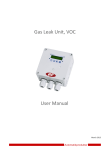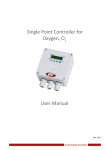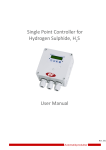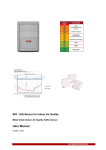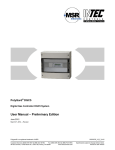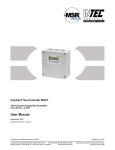Download User Manual - Automatikprodukter
Transcript
Single Point Controller PBIO Air Quality (VOC) Transmitter User Manual March, 2012 1 Intended Use ............................................................................................................................................. 4 1.1 1.2 1.3 2 Operating Instruction ............................................................................................................................... 5 2.1 2.2 2.3 3 Normal Mode ....................................................................................................................................... 4 Alarm Mode ......................................................................................................................................... 4 Fault Mode .......................................................................................................................................... 4 Description Keypad User Interface ..................................................................................................... 5 Setting / Changing Parameters or Set points...................................................................................... 5 Code Level .......................................................................................................................................... 6 Menu Overview ......................................................................................................................................... 7 3.1 Fault Management .............................................................................................................................. 8 3.1.1 Acknowledge a Fault.................................................................................................................... 8 3.1.2 Error Memory ............................................................................................................................... 8 3.1.3 System Errors .............................................................................................................................. 9 3.2 Status Alarm ........................................................................................................................................ 9 3.3 Status Relay ...................................................................................................................................... 10 3.3.1 Manual Operation of the Relays ................................................................................................ 10 3.4 Menu Measuring Values ................................................................................................................... 11 3.5 Menu Relay Parameters ................................................................................................................... 11 3.5.1 Relay Mode ................................................................................................................................ 12 3.5.2 Relay Function Static / Flash ..................................................................................................... 12 3.5.3 Latching Mode ........................................................................................................................... 12 3.5.4 Horn Function ............................................................................................................................ 13 3.5.5 External Relay Operation ........................................................................................................... 14 3.5.6 Delay Mode of the Relay............................................................................................................ 14 3.6 Menu MP Parameters ....................................................................................................................... 14 3.6.1 Activate – Deactivate MP ........................................................................................................... 16 3.6.2 Selection Gas Type.................................................................................................................... 16 3.6.3 Measuring Range....................................................................................................................... 17 3.6.4 MP Signal ................................................................................................................................... 17 3.6.5 Threshold / Hysteresis ............................................................................................................... 17 3.6.6 Delay of Alarm ON or OFF......................................................................................................... 17 3.6.7 Control Mode ............................................................................................................................. 18 3.6.8 MP Fault Assigned to Alarm ...................................................................................................... 18 3.6.9 Alarm Assigned to Alarm Relay ................................................................................................. 18 3.6.10 MP Signal Assigned to Analog Output....................................................................................... 18 3.7 Menu System Parameters................................................................................................................. 19 3.7.1 Service Mode ............................................................................................................................. 20 3.7.2 Software Version ........................................................................................................................ 20 3.7.3 Maintenance Concept ................................................................................................................ 20 3.7.4 Average Function ....................................................................................................................... 20 3.7.5 Customer Password (Code 4).................................................................................................... 21 3.7.6 Analog Output ............................................................................................................................ 21 3.7.7 Define the Failure Relay ............................................................................................................ 21 3.7.8 4 Power On Time .......................................................................................................................... 21 Mounting / Electrical Connection ......................................................................................................... 22 4.1 4.2 4.3 5 Electrical Connection ........................................................................................................................ 22 Connection Diagram ......................................................................................................................... 23 Connector Block / Overview SPC-X3 Module ................................................................................... 24 Commissioning....................................................................................................................................... 25 5.1 5.2 6 Commissioning .................................................................................................................................. 25 Checklist Commissioning .................................................................................................................. 26 Configuration and Parameter Card....................................................................................................... 27 6.1 6.2 6.3 Configuration Card of System Parameters ....................................................................................... 27 Configuration Card of Alarm Relays ................................................................................................. 27 Configuration Card of Measuring Parameters .................................................................................. 27 7 Specifications PBIO 230 ........................................................................................................................ 28 8 Gas Sensor .............................................................................................................................................. 29 8.1 8.2 9 Description ........................................................................................................................................ 29 VOC Measurements .......................................................................................................................... 29 Commissioning....................................................................................................................................... 30 10 Inspection and Service ....................................................................................................................... 30 10.1 10.2 Inspection ...................................................................................................................................... 30 Exchange of Sensor Element ........................................................................................................ 30 11 Specification Gas Sensor .................................................................................................................. 31 12 Part Disposal ....................................................................................................................................... 32 13 Notes and General Information ......................................................................................................... 32 13.1 13.2 13.3 13.4 Intended Product Application......................................................................................................... 32 Installers` Responsibilities ............................................................................................................. 32 Maintenance .................................................................................................................................. 32 Limited Warranty ........................................................................................................................... 32 Single Point Gas Controller PBIO 1 Intended Use The PBIO Gas Controller is used for measuring and controlling of the indoor air quality. The controller is equipped with an internal gas sensor (MP01) for VOC. One external gas transmitter (MP02) for toxic, combustible or refrigerant gases can be controlled additionally. Four alarm thresholds are free adjustable for each Measuring Point (MP). Every alarm threshold can be assigned to one of the maximum 4 alarm outputs (RX). The Gas Controller can interface via the (0)4 to 20 mA or (0)2 to 10 V output signal with any compatible electronic analog control, DDC/PLC control or automation system. The free adjustable parameters and alarm threshold make a very flexible use in the gas measuring possible. Simple and comfortable commissioning is possible due to factory adjusted parameters. The configuration parameter settings and operation is easy to do without programming knowledge. The intended sites within the ambient conditions as specified in the Technical Data are all areas being directly connected to the public low voltage supply, e.g. residential, commercial and industrial ranges as well as small enterprises (according to EN50 082). The Single Point Gas Controller PBIO must not be used in potentially explosive atmospheres. 1.1 Normal Mode In normal mode, the gas concentrations of the active transmitters are continuously polled and displayed at the LCD display in a scrolling way. The controller also monitors the communication to all active transmitters. 1.2 Alarm Mode If the gas concentration reaches the programmed alarm threshold, the alarm is started, the assigned alarm relay is activated and the red alarm LED is flashing. The set alarm can be read from the menu Alarm Status. When the gas concentration falls below the alarm threshold, the alarm in automatically reset. In latching mode, the alarm has to be reset manually in the menu Relay Status. 1.3 Fault Mode If the controller detects an analog signal outside the admissible range (< 3 mA - > 22 mA) from an active transmitter, the assigned fault relay is set and the error LED is blinking. The error is displayed in the menu Error Status in clear text. After removal of the cause, the error message is acknowledged in the menu Error Status. 2 Operating Instruction The complete configuration, parameterization and service are made via keypad user interface in combination with the display screen. Security is provided via two password levels. 2.1 Description Keypad User Interface Exits programming, returns to the previous menu level. Enters submenus, saves settings. Scrolls up in main menu and submenus, increases or decreases a value. Moves the cursor position. LED orange: Flashes when alarm one or more alarms are active. Permanently on, when at least one of the relays is manually operated. LED red: Flashes when alarm two or more alarms are active. Permanently on, when at least one of the relays is manually operated. LED yellow: Flashes at system or sensor failure or when maintenance needed. LED green: Power LED 2.2 Setting / Changing Parameters or Set points Open desired menu window. Code window opens, if no code level approved. After input of the valid code the cursor jumps on the first position segment to be changed. Push the cursor onto the position segment, which is to be changed. Change the parameter / set point. Save the changed value. Finished. 2.3 Code Level All inputs and changes are protected by a four-digit numeric code (= password) against unauthorised intervention. All menu windows are visible without entering a code. Level 1: (1234) Code level 1 allows the operator to acknowledge alarms and to manually activate the alarm relays. Level 2: Code level 2 is intended for the service technician to change parameters and set-points. Level 3: With code level 3 it is possible to register and deregister transmitters in addition to code level 1. This code is released by AP only in emergency situations. Level 4: Code level 4 is intended for updating the maintenance date. Normally the code is only known by the service technician and can be changed individually via code level 2. The release of a code level is cancelled if no button is pushed within 15 minutes. 3 Menu Overview The operation of the Single Point Gas Controller PBIO is effected by a simple and logical menu structure which is easy to learn. The operating menu contains the following levels: Starting menu. Scrolling of the measuring points of all registered transmitters in 10-second intervals Main menu Submenu 1 and 2 Starting menu Automatikprodukt PBIO - 230 Main menu After 20 sec. System Errors Status Alarm Status Relay Measuring Values Relay Parameter MP Parameter System Parameter Submenu Display of gas concentration Display and reset of errors See from point 3.1 Displays the status of actual alarms See point 3.2 Display of the relay status Manual operation of the relays Reset function of the relays See from point 3.3 Displays the measuring values See point 3.4 Display and change of the relay parameters See from point 3.5 Display and change of the measuring point parameters Activate or Deactivate MP Assignment of the alarms to the alarm relay See from point 3.6 Display and change of the system parameters See from point 3.7 3.1 Fault Management The integrated fault management records the last 15 faults in the menu “System Errors” with a stamp indicating how many days the error has already existed. The day counter subtracts “active ones” from 365. Additionally a record of the faults occurs in the “Error Memory”, which can be selected and reset only by the service technician. An actual fault is displayed in plain text in the starting menu; the failure relay which is defined in the system parameter “Failure relay” is activated and the yellow LED in the front of the gas controller flashes. In case of fault of a measuring point (MP) the alarms defined in the menu “MP Parameter” are activated additionally. 3.1.1 Acknowledge a Fault Attention: Acknowledging a fault is only possible after having removed the cause. System Errors Select menu “System Errors” MP 02 < 3mA Days 23 Example: Failure MP 01 < 3 mA MP 02 < 3mA Reset ?? Reset the fault? Fault reset MP 02 < 3mA Erased Fault reset 3.1.2 or Error still exists Cause not eliminated Reset not possible Error Memory The menu “Error Memory“ in the main menu “System Error” can only be opened via code level 2. In the error memory the last 15 faults are listed for the service technician even if they were already acknowledged in the menu “System Error“. The deletion of each individual message is effected in the same way as the reset of a fault. 3.1.3 System Errors The following system error messages are recorded: MP 02 > 22 mA Cause: Short-circuit at analog input or transmitter not calibrated, transmitter defective. Solution: Check cable to transmitter, make calibration, replace the transmitter. MP 02 < 3 mA Current signal to analog input < 3 mA / 1,3 VDC. (External Transmitter) Cause: Wire breaking at analog input or transmitter not calibrated, transmitter defective. Solution: Check cable to transmitter, make calibration, replace the transmitter. Internal communication error I/O Board to LCD Board. GC Error: 3.2 Current signal at analog input > 22 mA / 11 VDC. (External Transmitter) Cause: Internal error. Solution: Change the Gas Controller module. Maintenance: System maintenance is necessary. Cause: Maintenance date exceeded. Solution: Make the maintenance. Status Alarm Display of the actual alarms in plain text in the order of their arrival. Only those measuring points are displayed, where at least one alarm is active. Changes are not possible in this menu. MP 01 A1 A2 Symbol MP 01 AX Description Measuring (MP) Point No. Status alarm Function A1 = A2 = A3 = A4 = Alarm 1 Alarm 2 Alarm 3 Alarm 4 ON ON ON ON 3.3 Status Relay The PBIO has two alarm relays (R01 / R02) and two open collector outputs (R03 / R04). In the following description they are referred to as alarm relays. Display of the actual status of alarm relays. Manual operation of the alarm relays. R 01 OFF 3.3.1 Symbol Description R 01 Relay No. 01 OFF Status relay Setting Status OFF Function Select Relay No. OFF = Relay OFF (No gas alarm) ON = Relay ON (Gas alarm) Manual OFF = Relay manual OFF Manual ON = Relay manual ON Manual Operation of the Relays The manual operation of the alarm relays is managed in the menu “Status Relay”. If a relay is in the manual ON or OFF status, the orange/ red alarm LED at the Gas Controller is lit continuously. The external operation of the alarm relay via an assigned digital input has priority to the manual operation in the menu "Status Relay" and to gas alarm. Relays manually operated in the menu “Status Relay” are deleted again by selecting the function "Automatic". Acknowledging the relays in latching mode is also effected in this menu. R 01 OFF Manual ON Manual OFF Manual OFF Select the relay Select the function of manual operation Select the function Take over the function Manual ON Manual OFF Automatic Reset? = Relay ON = Relay OFF = Delete manual operation. = Reset of a latching mode. 3.4 Menu Measuring Values This menu is for displaying the current value (CV) or the average value (AV) with gas unit and gas type for each active measuring point according to the defined mode of control (CV or AV mode). For gas type CO both values are displayed together. MP 01 VOC ppm 33 CV 3.5 Setting Status Function Symbol Description MP 01 VOC ppm CV AV * Not active Error Measuring P. No. Gas type VOC Gas unit Current value CV Average value Control mode Status MP Not active Fault MP Selection of MP No See 3.6.2 See 3.6.2 Current value of gas concentration Average value (10 measured values within the time unit) Display of selected control mode (CV or AV) MP not active Current signal < 3 mA or > 22 mA Menu Relay Parameters Display and change of the parameters for each alarm relay Relay Parameter (Main menu) R 01 (Select relay No.) Relay Mode De- energized Relay mode See 3.5.1 Static / Flash 0s Relay function See 3.5.2 Latching Mode No Time 0s Quitt. 0 Activate latching mode See 3.5.3 DI 0 External Mode DI: ON = 0: OFF = 0 Delay ON Time 0s Delay OFF Time 0s Definition of horn function See 3.5.4 Definition of external relay operation See 3.5.5 Set delay ON time See 3.5.6 Set delay OFF time See 3.5.6 3.5.1 Relay Mode Definition of relay mode: Symbol Description R 01 Relay No. Function Selection of relay DeRelay Mode energized 3.5.2 Setting Status DeDe-energized energized Energized = Alarm ON = Relay ON = Alarm ON = Relay OFF Relay Function Static / Flash Definition of relay function 3.5.3 Symbol Description R 01 Relay No. 0 Function Setting Status Function Selection of relay 0 0 = Relay function static > 0 = Relay function flashing (= Time period in sec.) Impulse / Break = 1:1 Setting Status Function Latching Mode Definition of latching function Symbol Description R 01 Relay No. Selection of relay No Latching Mode No No Yes = Latching mode non active = Latching mode active Acknowledging a latching relay in the menu “Status Relay“ is only possible if the gas concentration is again lower than the alarm threshold including hysteresis. In this case the status latching occurs in the display. Example: Alarm relay R2 with latching mode Alarm 2 On Gas concentration higher Off Display in the Menu Status Relay Relay 2 Reset in the Menu Status Relay R2 Off On Off On Off R2 On R2 On R2 On lower than threshold R2 Latching R2 Off 3.5.4 Horn Function The internal horn is connected to alarm relay R3 (open collector). With this parameter the alarm relay is defined as horn relay with the following possibilities to reset. By pressing any of the 4 push-buttons (only possible in the starting menu). Automatic reset at the end of the fixed time. By an external push-button (assignment of the digital input). The horn function is only activated if at least one of the two parameters (time or digital input) is set. Special function Response After acknowledging the output (by push-button or externally) time starts. When this time has run out and the alarm is still acting, the relay is set again. Symbol Description R 03 Relay No. Quitt Mode Setting Status Function Selection of relay 0 0 = Reset of the relay after time having run out, or by push-button 1 = Reset of the relay by push-button, after time having run out and when alarm is still acting, relay is set again. (Response function). Time 120 Time for automatic reset function or response function 0 = no reset function DI 0 Assignment, which digital input resets the output. Acknowledge the horn output Alarm 3 On Gas concentration higher Of lower than threshold Time Relay 3 On Off Acknowledging signal On Off Special function „Response“. (Return of the horn relay) Alarm 3 On Gas concentration higher Off Time Relay 3 On Off Acknowledgingsignal On Off Time lower than threshold 3.5.5 External Relay Operation Assignment of the digital input (DI) for external switching of the alarm relay (ON and/or OFF). This function has priority to gas alarm and/or manual switching in the menu “Status Relay“. 3.5.6 Symbol Description R 01 DI-ON DI-OFF Relay No. External On External Off Setting Status Function Relay Selection 0 0 If digital input closed, relay switches ON If digital input closed, relay switches OFF Delay Mode of the Relay. Delay time ON starts when the alarm is released and/or delay time OFF starts when the alarm returns to normal condition. 3.6 Setting Status Symbol Description R 01 Relay No. 0s Delay Time ON 0s Delay Time OFF 0 Function Relay Selection Mode ON: Relay is only activated at the end of the defined time (sec.) 0 sec. = No delay 0 Mode OFF: Relay is only deactivated at the end of the defined time (sec.) 0 sec. = No delay Menu MP Parameters Display and change of parameters, assignment of alarms to alarm relays and activation of Measuring Points (MP). MP Parameter (Main Menu) MP 01 active (Selection of MP) MP Mode active Gas Type VOC Measuring Range 4000 ppm MP Signal linear Activate or deactivate MP See 3.6.1 Define gas type See 3.6.2 Define measuring range See 3.6.3 Adjust signal form of the transmitter See 3.6.4 Threshold 1 800 ppm Threshold 2 1500 ppm Threshold 3 4000 ppm Threshold 4 4000 ppm Hysteresis 200 ppm Delay ON Time 0s Delay OFF Time 0s C/A Mode CV Alarm - 1 2 3 4 Fault - 0 0 0 0 A1; A2; A3; A4 01; 02; 03; 04 Analog Output 0 Define threshold 1 See 3.6.5 Define threshold 2 See 3.6.5 Define threshold 3 See 3.6.5 Define threshold 4 See 3.6.5 Hysteresis See 3.6.5 Set delay ON time See 3.6.6 Set delay OFF time See 3.6.6 Define control mode See 3.6.7 Assign MP fault to alarm See 3.6.8 Assign alarm to alarm relay See 3.6.9 Assign MP signal to analog output See 3.6.10 3.6.1 Activate – Deactivate MP Symbol Description MP 01* Measuring point Active MP Status Setting Status Not active Function Selection MP No. Active = Measuring point activated at the controller Not active = Measuring point not activated at the controller *MP01 = On Board sensor *MP02 = Externer Transmitter (optional) 3.6.2 Selection Gas Type Assign gas type to attached gas transmitters. Symbol Description MP 01 Measuring point VOC Gas type Setting Status VOC Gas type CO O2> O3 TOX CO2 RH Temp. R22 R134 R123 R11 R411 R410 R407 R416 R404 R409 R408 R402 R401 VOC ETC Cl2 H2S SO2 Ex O2< NH3 NO2 NO Ex 1 Unit Carbon monoxide Oxygen (increasing)2 Ozone Toxic gas Carbon dioxide4 Humidity Temperature Refrigerant gas Refrigerant gas Refrigerant gas Refrigerant gas Refrigerant gas Refrigerant gas Refrigerant gas Refrigerant gas Refrigerant gas Refrigerant gas Refrigerant gas Refrigerant gas Refrigerant gas Air quality Ethylene oxide Chlorine Hydrogen sulphide Sulphur dioxide Carbon dioxide5 Oxygen (falling)3 Ammonia Nitrogen dioxide Nitrogen oxide Combustible gas Recommendation without obligation Oxygen measurements: Alarm at increasing concentration 3 Oxygen measurements: Alarm at falling concentration 4 Carbon dioxide measurements with unit ppk (1 vol% = 10 ppk) 5 Carbon dioxide measurements with unit ppm (1 vol% = 10.000 ppm) 2 ppm Vol% ppm ppm ppk % RH. °C ppm ppm ppm ppm ppm ppm ppm ppm ppm ppm ppm ppm ppm ppm ppm ppm ppm ppm ppm Vol% ppm ppm ppm %LEL Measuring range1 0 – 300 0 – 25 0–5 0 – XX 0 – 50 0 – 100 0 – 50 0 – 2000 0 – 300 0 – 300 0 – 300 0 – 300 0 – 300 0 – 300 0 – 300 0 – 300 0 – 2000 0 – 2000 0 – 2000 0 – 2000 0 – 2000 0 – 20 0 – 100 0 – 200 0 – 100 0 – 2000 0 – 25 0 – 300 0 – 25 0 – 50 0 – 100 3.6.3 Measuring Range The measuring range can be defined arbitrarily between 10 and 10000. The measuring ranges in the table gas type are only recommendations without obligation. The measuring range for MP01 (on-board gas sensor) is factory set, the measuring range for MP02 must agree with the signal (4 to 20 mA / (0)2 to 10 V) of the attached gas transmitter. (4 mA / (0)2 V = Display 0 (ppm); 20 mA / 10 V = Display of the full scale value) 3.6.4 MP Signal Gas transmitters using electro-chemical or catalytic beat gas sensors normally produce a linear 4 to 20 mA / (0)2 to 10 V signal, proportional to the gas concentration. Semiconductor gas sensors produce a non-linear (exponential) signal. This signal leads to a non-linear 4 to 20 mA / (0)2 to 10 V signal of the gas transmitter. The Gas Controller PBIO is prepared for gas transmitters with linear signal as well as for µGard analog transmitters with semiconductor sensor and non-linear signal. The classification of signals is defined in this menu. 3.6.5 Symbol Description MP 01 Measuring Point Linear MP Signal Setting Status Linear Function Selection of MP No. Linear = Transmitter with linear output signal Non linear = Transmitter with non-linear output signal Threshold / Hysteresis For each measuring point four alarm thresholds are available for free definition. If the gas concentration is higher than the adjusted alarm threshold, the associated alarm is set. If the gas concentration falls below the alarm threshold inclusive hysteresis the alarm is again reset. Unused alarm thresholds have to be defined as full scale value, in order to avoid false alarms. For O2 measurement: Pay attention to the alarm activation at decreasing or increasing concentration! Symbol Description MP 01 40 ppm 3.6.6 Default Status Function Measuring Point Threshold 800 1500 4000 4000 200 Threshold 1 Threshold 2 Threshold 3 Threshold 4 Hysteresis Selection MP No. Gas concentration > Threshold 1 = Alarm 1 Gas concentration > Threshold 2 = Alarm 2 Gas concentration > Threshold 3 = Alarm 3 Gas concentration > Threshold 4 = Alarm 4 Gas concentration < (Threshold X –Hysteresis) = Alarm X OFF Delay of Alarm ON or OFF Definition of alarm ON and/or alarm OFF delay. The function applies to all alarms of an MP. Default Status Symbol Description MP 01 Measuring Point 0s Delay Time ON 0s Delay Time OFF 0 0 Function Selection of MP No. Gas concentration > Threshold: Alarm is only activated at the end of the fixed time (sec.). 0 sec. = No Delay Gas concentration < Threshold: Alarm is only deactivated at the end of the fixed time (sec.). 0 sec. = No Delay The delayed activation of an existing gas alarm can cause damage to persons and objects. The commissioning technician and/or the operator are solely responsible for the activation. 3.6.7 Control Mode Definition of the alarm evaluation by means of current (CV) or average value (AV). Symbol MP 01 CV Default Function Status t Measuring Point Selection of MP No. CV = Control by the current gas value Evaluation CV AV = Control by the average gas value Description Current/ average value function see also: 3.7.4 3.6.8 MP Fault Assigned to Alarm In this menu it is defined, which alarms are activated in case of a fault at the measuring point. Symbol Description MP 01 Alarm - 1 2 3 4 Fault - 0 0 0 0 Measuring Point 3.6.9 Failure MP Default Status 0000 Function Selection of MP No. 0 = Alarm not ON at MP failure 1 = Alarm ON at MP failure Alarm Assigned to Alarm Relay Each of the 4 alarms can be assigned to any alarm relay. Unused alarms are not assigned to any alarm relay. Symbol Description MP 01 Measuring Point 1 A1 A2 A3 A4 3.6.10 Default Status Function Selection of MP No. 01 02 03 00 01 = Alarm 1 activates alarm relay R 01 02 = Alarm 2 activates alarm relay R 02 03 = Alarm 3 activates alarm relay R 03 00 = Alarm 4 doesn’t activate any alarm relay MP Signal Assigned to Analog Output The measuring point signal can be assigned to the analog output. At this the signal defined in the control mode (current or average value) is transmitted. Analog output see also: 3.7.7 Symbol Description MP 01 Measuring Point 0 A Default Status 0 Function Selection of MP No. 0 = MP Signal not assigned to analog output 1 = MP Signal assigned to analog output 1 3.7 Menu System Parameters Displays and changes the system parameters of the Gas Controller module. System Parameter (Main Menu) Service Mode OFF See 3.7.1 Software Version SPC03- XX See 3.7.2 Maintenance due in days 211 See 3.7.3 Service Phone +4631287202 See 3.7.3 AV Overlay 120 s. 120 ppm See 3.7.4 AV Time 1800 s See 3.7.4 Maintenance interval Days 365 See 3.7.3 Customer Pass Change **** See 3.7.5 Failure Relay XX See 3.7.7 Power On Time 30 s See 3.7.8 Analog Output Analog Output 1 Max. See 3.7.7 Calibration AO 1 4.0=4 mA 20 = 20mA See See 3.7.7 3.7.1 Service Mode When the service mode is active (ON) the alarms are not transmitted to the alarm relays (in case of calibration or service work). The service mode is reset automatically after 60 minutes or manually in the menu “Service Mode”. 3.7.2 3.7.3 Symbol Description Default Status Function Off Service Mode Off Off = Alarms activate the associated alarm relays On = Alarms are not transmitted to the alarm relays Default Status Function Software Version Symbol Description PBIO 230 Software Version XX = Software Version Maintenance Concept Integrated in the PBIO system there is a control of the maintenance intervals required by law or by the customer. At commissioning or after maintenance the number of days until the next due maintenance is entered = Reset of the maintenance message (service phone no.). When the days counter reaches zero, the failure signal is activated the following morning at 9 o’clock, and the phone no. of the service technician occurs in the display. The remaining days until the next maintenance can be read from the menu “Maintenance in”. The service phone no. can be entered individually in the next menu. 3.7.4 Symbol Description XXX Maintenance in XXX Maintenance interval 0853.... Phone No. Defa Function ult Remaining days until the next maintenance Reset of the maintenance message by entering the number of 365 days until the next maintenance Input of the individual service phone no. Average Function For each active measuring point the Single Point Gas Controller calculates the arithmetic average value out of 10 measurements got within the time unit defined in the menu “AV Time“. This average value is indicated in the menu “Measuring Values” next to the current value. At each measuring point the control mode (current or average value) is defined for the alarm evaluation. The alarm evaluation of the control mode average value is overlaid by the current value, when the current value exceeds the alarm threshold defined in the menu “AV Overlay“. The overlay is delayed by the time factor defined in this menu. Whit time factor 0 sec. the overlay is not active. Symbol Description 120 s AV Overlay 120 ppm 1800 s AV Time Default Status 120 s 120 ppm 1800 s Function sec. = Delay time of average value overlay. 0 = No overlay function ppm = Alarm threshold of average overlay sec. = Time for the calculation of the average value 3.7.5 Customer Password (Code 4) Change the system password for level 4 Symbol Description XXXX Customer Password 3.7.6 Default Status Function XXXX = Definition of an individual 4-digit customer’s password (level 4) Analog Output The Single Point Gas Controller has one analog output (AO01) with (0)4 to 20 mA / (0)2 to 10 V signal. The signal of MP01 or/and MP02 can be assigned to the analog output. The assignment is effected in the menu “MP Parameters“ for each MP. The measuring point sends the signal, which is defined in the menu “C/A Mode“. The output signal (mA / V) and starting point (0 / 20%) is selected at the I/O board by means of bridges/ jumpers. See fig. 5. Out of the signals of all assigned measuring points the Single Point Gas Controller determines the minimum, the maximum or the average value and transmits it to the analog output. The definition, which value is transmitted, is effected in the menu “Analog Output 1“. The analog output can be calibrated at 4 and at 20 mA, only in mA mode. Therefore an ampere meter (measuring range 25 mA) can be attached to the AO and the respective factor has to be changed until the analog output corresponds to 4 and/or 20 mA. During calibration evaluation of the measuring point signals is not possible. This calibration is effected by the factory. The factors shall not be changed. Default Status Symbol Description Max. Select Max. Output Mode 4.0 20.0 Calibration 3.7.7 4.0 20.0 Function Min. = Displays the minimum value of all assigned MP Max. = Displays the maximum value of all assigned MP Average = Displays the average value of all assigned MP 4.0 20.0 = Calibration factor at 4 mA = Calibration factor at 20 mA Define the Failure Relay Definition of the failure relay. See also fault management (3.1) 3.7.8 Symbol Description X Fault Relay Default Status RX Function RX = Define the fault relay Power On Time Gas sensors need a running-in period, until the chemical process of the sensor reaches stable conditions. During this running-in period the current signal can lead to an unwanted releasing of a pseudo alarm. ‘ Therefore the power on time is started at the PBIO after having switched on the power supply. While this time is running out, the Gas Controller does not activate any alarms. The power on status occurs in the starting menu. Symbol Description 30 s Power On Time Default Status 30 s Function XX = Define the power on time (sec.) 4 Mounting / Electrical Connection The Gas Controller is fixed to the wall through the mounting holes at the 4 corners of the housing. These mounting holes are accessible after opening the housing. If the mounting holes at the bottom of the housing are used, the device loses the IP 65 protection. The mounting holes at the plastic housing are covered with the enclosed caps after the end of the assembly. We recommend considering the following when choosing the mounting position: Mounting height: About 1.2 to 1.8 m (4 to 6 ft.) above floor Do not mount the transmitter next to doors, windows, air inlets and outlets. Free air supply must be granted. Vertical mounting (air inlet at the transmitter down/up) Avoid direct sunlight. Customer’s instructions. 130 mm Mounting holes Fig. 01 4.1 130 mm 115 mm 115 mm Standard plastic housing Stainless steel housing Electrical Connection The technical requirements and regulations for wiring, electrical security, as well as project specific and environmental conditions etc. must be observed when mounting. The electrical installation may only be completed by a qualified electrician in full compliance with pertinent regulations. We recommend the following cable types1 1 Power supply Alarm relay Gas transmitter J-Y(St)Y 2x2 x 0,8 J-Y(St)Y 2x2 x 0,8 J-Y(St)Y 2x2 x 0,8 The recommendation does not consider local conditions such as fire protection etc. For the exact position of the terminals see the following connection diagram. When choosing the option „Power Supply“ you have to make sure that a switch or a circuit breaker is provided in the building automation especially for the PBIO . It must be installed easily accessible near the PBIO . It has to be marked as a disconnecting device for the PBIO . This switch or circuit breaker shall meet the relevant requirements of IEC 60947-1 and IEC 60947-3. Connection Diagram 5 4 3 2 0(2) -20V 24 VDC 0 VDC SPC-X3 Option Internal Buzzer X5 DIO 1 5 4 3 2 4 -20mA 24 VDC 0 VDC V- V+ 24 VDC 230 VAC L N PE 6 5 Analog_Inp X4 4 Analog_Out R4Option Internal Flashlight 0V R1 3 24 VDC_Out 2 0 VDC 1 24 VDC 0V 24 VDC X4 Analog Output Analog Output Signal: adjustable via jumper (0)4-20mA / (0)2-10 V Option External Transmitter (MP 02) + 24V 0V 7 Digital Input 2 R3 R2 4 5 ----- X5 Option External Warning Light 6 NO_1 7 NC_1 8 COM_1 COM_2 10 NO/NC_2 11 X5 2 3 4 11 K3 * 14 12 * Pin 4 = Alarm 4 Pin 2 = Alarm 3 Option Power Relay K3 max. 250 VAC / 5 A R1: SPDT, 30 VAC/DC, 0.5 A R2: SPNO/SPNC, 30 VAC/DC, 0.5 A R3/R4: Open Collector, 30 VDC, 50 mA 2 0 VDC 1 24 VDC X4 Option Power Supply 90 - 230 VAC Option External Buzzer 2 3 4 3 9 NC NO 4.2 6 7 8 2 0 VDC 1 24 VDC X4 9 10 X5 11 K1 14 12 11 K2 14 12 Option Power Relay max. 250 VAC / 5 A Fig. 2 Connection diagram * The analog input function is determined by the hardware. Each PCB has got a label with the specific type. See fig. 4. Connector Block / Overview PBIO 230 Module Not set Output signal 0 – 20 mA Set Not set 4 – 20 mA Not set Set 0 – 10 V Set Set 2 – 10 V Jumper 0- 20 % Not set Fig. 4 Selection Output Signal Option: Power Supply 90-230 VAC 12 12 12 K1 X5 X4 A1 A1 A1 A2 A2 A2 Fig. 5 Housing Option Power Relay 14 14 14 6 7 8 9 10 1 2 3 4 5 6 7 1 2 3 4 11 11 11 K3 Fig. 3 PCB Jumper V-A K2 4.3 5 5.1 Commissioning Commissioning Prior to commissioning, the wiring of the PBIO including all field devices must be completely terminated! Check the optional external transmitter input signal (current or voltage signal). It has to be the same as indicated on the label of the PCB. See fig. 3. Select the contact for relay 2 with jumper NC/NO. See fig. 2 and 3. Select the analog output signal with jumper V-A and 0-20%. See fig. 3 and 4. After switching the power supply “ON” and at the end of the Power ON Time, the SPC-03 is ready for use. The PBIO is delivered with standard parameters and set points for the on-board sensor (MP 01). These parameters have to be checked at commissioning and adjusted if necessary. If an additional external transmitter is connected, then you have to set the parameters for MP02 according to the intended application. The standard parameters can be taken from the following configuration and parameter card. We recommend registering the individual parameters and set points into the list. We recommend checking the parameters and set points according to the following check list. 5.2 Checklist Commissioning System Parameter Finished Parameter Parameter of average function Password level 1 (customer’s password) Function analog output Define fault relay Power ON time Service phone no. Maintenance date Relay Parameter Parameter Relay R 1 Finished 2 3 Relay mode Function static / flash Latching mode Horn function External relay operation Delay ON time Delay OFF time MP Parameter Finished Parameter MP No. 1 1 2 MP mode Gas type Measuring range MP signal Threshold 1 Threshold 2 Threshold 3 Threshold 4 Hysteresis Delay ON time Delay OFF time C/A mode Assigned failure <> alarm Assigned alarm <> alarm relay Assig. MP sig. <> analog output 1 MP 01 = On Board Sensor, MP 02 = external Transmitter 4 6 Configuration and Parameter Card Commission: Customer: Commissioning - Company Commissioning - Date 6.1 Project No. Service Technician Configuration Card of System Parameters Service Software MaintenService Version ance due Phone in x days Default PBIO 211 0853190040 AV Overlay ppm Time AV Time 120 120 1800 Maintenance interval 365 Costumer Pass Fault Relay 1234 0 Analog Output 1 Calibration Mode = 4 = 20 Max. 4.0 20.0 6.2 Configuration Card of Alarm Relays Relay No. Mode Default Energized R01 R02 R03 R04 6.3 Static Latching Flash Mode 0s No Horn Function Time Quitt 0 0 External ON OFF DI DI 0 0 DI 0 Configuration Card of Measuring Parameters MP No. MP Gas Status Type De Active VOC fault 01 02 Delay Time (sec.) ON OFF 0 0 CV/ AV CV Meas MP uring Signal Range A1 A2 A3 A4 4000 Linear 800 1500 4000 4000 Thresholds Assigned MP Fault < >Alarm A1 A2 A3 A4 0 0 0 0 Hyst 200 Assigned Alarm <> Alarm Relay A1 A2 A3 A4 R1 R2 R3 R4 AO 0 Delay Time ON OFF DI DI 0 0 Power ON Time 30 s 7 Specifications PBIO Electrical Power supply Power consumption (without options) Analog output signal, (0 - 4000 ppm) Selectable: Current / Voltage : Starting point 0 or 20% Alarm relay (R1) Alarm relay (R2) Binary output (R3; R4) Visualization Display Status LED (4) Operation Operation Environment Humidity Working temperature Storage temperature Pressure range Physical Enclosure plastic version, type C Combustion Colour Dimensions (W x H x D) Weight Protection Installation Cable entry Wire connection Guidelines Warranty Analog input (external transmitter) Analog input (1) Power supply for external analog transmitter Buzzer Acoustic pressure Frequency LED flashlight red Flashing frequency Luminosity Power supply 90 - 230 VAC Consumption max. Power Relay (K1 – K3) Switch capacity Serial Interface Transceiver Heating Temperature controlled Ambient temperature Power consumption Duct mounting version Flow speed Duct diameter 18 – 28 VDC/AC, reverse polarity protected 100 mA, max. 2,5 VA (0) 4 – 20 mA, load 500 Ω (0) 2 – 10 V, load ≥ 50 kΩ Proportional, overload and short-circuit-proof 30 VAC/DC, 0,5 A, potential-free, SPDT 30 VAC/DC, 0,5 A, potential-free, SPNO/SPNC 30 VDC, 0,05 A open collector output Two lines, each 16 characters Normal operation- Fault- Alarm 1- Alarm 2 4 push- buttons, menu-driven 15 – 90 % RH non condensing - 10° C to + 50° C (14 °F to 122 °F) 5° C to + 30° C (41 °F to 86 °F) Atmospheric ± 10 % Polycarbonate UL 94 V2 RAL 7032 (light grey) 130 x 130 x 75 mm (5.12 x 5.12 x 2.95 in.) Approx. 0.6 kg (1.32 Ibs.) IP 65 Wall mounting Standard 3 x M 20 Screw type terminals min. 0.25 to 2.5 mm2 (14 to 30 AWG) EMC Guidelines 2004/108/EEC Low voltage guideline 73/23/EEC; CE One year material (without sensor) 4 – 20 mA, input resistance 200 , (0) 2 – 10V, input resistance 25 k, overload- and short-circuit-proof 24 VDC max. 50 mA 85 dB (A) (distance 300 mm) (1 ft.) 3500 Hz Adjustable > 5.000 mcd 25 VA 250 VAC, 5 A, potential-free, SPDT RS 485 / 19200 Baud 3 ± 2 °C (38 °F ± 3.6 °F) -40 °C (-40 °F) 0.3 A; 7.5 VA 5000 - 20.000 m/h (3 to 12 miles/h) ca. 200 – 1000 mm (8 – 40 inch.) 8 8.1 Gas Sensor Description The semi-conducting metal oxide sensor measures the electrical conductivity of the nanocrystalline metal oxide coated on a heatable substrate. The typical operating temperature is between 300 and 400 °C. The doping of the metal oxide with noble metals results in a positive sensibility to combustible gases like VOCs, carbon monoxide and natural gas. The doping permits the adaptation to the demands of the measuring task. VOCs are partially or totally burnt at the sensor surface by the oxygen of the metal oxide. The electrons released in the semi-conductor by this process lead to an increase of the electrical conductivity. At the end of the combustion process, the metal oxide returns to its initial state by incorporating oxygen from the air, with the conductivity also adopting the initial value. The change of the conductivity is evaluated via the internal micro-controller and output as a standard signal. 8.2 VOC Measurements The VOC content in indoor areas is mainly determined by the persons present and their activities. See table 1. When for example working with cleaning agents or when cooking, VOCs (Volatile Organic Compounds) are set free, but also human respiration is a constant source of volatile metabolism products (VOCs). The air quality sensor detects the increasing VOC level and calculates the proportional CO2 value. The VOC/CO2 correlation was determined by taking measurements under real conditions. See diagram 1. To this day, there aren’t any standard signals for the VOCs; therefore the IAQ air quality sensor reduces the measured VOC values to CO2 equivalents with the unit ppm. This grants the compatibility to existing CO2 ventilation standards. Each time the IAQ air quality transmitter is switched on, it runs through a warm-up period of 20 minutes. During this warm-up period there aren’t any measurements; the sensor outputs the signal of 80% of the measuring range. After the warm-up period, the sensor interprets the currently read VOC value as zero-point, independently from the actual concentration. An internal algorithm continuously updates the zero-point by taking the lowest measured VOC value. Therefore the ambient air should be of low VOC content after the warm-up period. This can be obtained by shortly venting when starting the measurements with the 80% signal. If the sensor isn’t started at low VOC concentrations, it can take a couple of days until the internal algorithm has updated the zero-point so far that effective measuring results are available. The natural sensor drift and ageing is corrected by the implemented control algorithms. Indoor Air Contamination Source Emission Source Typical Substances VOCs Ventilation Others Acetone, Ethanol, Isoprene CO2 Humidity Nonanal, Decanal, α-Pinene *Skin respiration & transpiration Humidity *Flatus Methane, Hydrogen Human Being *Cosmetics Limonene, Eucalyptol *Household Supplies Alcohols, Esters, Limonene Unburnt Hydrocarbons *Combustion CO (Engines, Appliances, Tobacco CO2 Smoke) Humidity *Paints Formaldehyde, Alkanes, *Adhesives Alcohols, Aldehydes, *Building Material *Solvents Ketones, Siloxanes *Furniture *Carpets *Office Equipment *PVC Toluene, Xylene, Decane +Consumer Products *Printers/Copiers, Benzene, Styrene, Phenole Computers *Breath Table 1 – Typical indoor air contaminants (VOC and others) demand controlled permanent (5-10%) VOCs CO2 Window opened/closed Odors VOCs 0 CO2 1h 2h 3h 4h Diagram 1: Correlation CO2- VOC (records from a business meeting session) 9 Commissioning Consider commissioning instructions at any exchange of the sensor element as well. Only trained technicians should perform the following: Check mounting location. Select output signal form: Current or voltage, and starting point 0 or 20%. See fig.5. Check power voltage. Check PCB SM03-002 for correct mounting at X4 and X5. 10 Inspection and Service Inspection, service and calibration of the PBIO should be done by trained technicians and executed at regular intervals. We therefore recommend concluding a service contract with AP or one of their authorized partners. According to EN 45544-4, inspection and service has to be executed at regular intervals. The maximum intervals have to be determined by the person responsible for the gas warning system according to the legal requirements. AP recommends checking the Transmitter every three months and maintaining it every 24 months. If different intervals are indicated, always consider the shortest interval. Inspections and services must be documented. The date for the next maintenance has to be affixed to the transmitter. 10.1 Inspection The PBIO should be controlled regularly by a competent person according to EN 45544-4. The following has to be checked in particular: Maintenance/ calibration interval not exceeded. Visual inspection of the transmitter including cable for damage etc. Remove dust deposits, especially at the gas inlet. The filter at the gas inlet has to be replaced if extremely dirty. Check the Function of Alarm relays 10.2 Exchange of Sensor Element Please send the complete PCB back to the manufacturer for exchange of the sensor. 11 Specification Gas Sensor Sensor performances Gas type Sensor element Measuring range * VOC (alcohols, aldehydes, aliphatic hydrocarbons, amines, aromatic hydrocarbons, carbon monoxides, methane, LPG, ketones and organic acids) Metal oxide semi-conductor 450 – 4000 ppm VOC Accuracy Repeatability Response time Warm-up time Sensor life expectancy ± 150 ppm ± 5 % of reading 20 min. > 10 years/ normal ambient conditions Humidity range – short-term Temperature range - continuous Temperature range – short-term Pressure range 15 – 95 % RH non condensing 0 °C to + 50 °C (32 °F to 122 °F) 0 °C to + 50 °C (32 °F to 122 °F) Atmospheric ± 10 % t90 < 60 s 12 Part Disposal Since August 2005 there are EC-wide directives defined in the EC Directive 2002/96/EC and in national codes concerning the waste electrical and electronic equipment and also regarding this device. For private households there are special collecting and recycling possibilities. For this device isn’t registered for the use in private households, it mustn’t be disposed this way. You can send it back to your national sales organisation for disposal. If there are any questions concerning disposal please contact your national sales organisation. Outside the EC, you have to consider the corresponding directives. 13 Notes and General Information It is important to read this user manual carefully in order to understand the information and instructions. The PBIO gas monitoring, control and alarm system may only be used for applications in accordance to the intended use. The appropriate operating and maintenance instructions and recommendations must be followed. Due to permanent product developments, AP reserves the right to change specifications without notice. The information contained herein is based on data considered to be accurate. However, no guarantee or warranty is expressed or implied concerning the accuracy of these data. 13.1 Intended Product Application The PBIO is designed and manufactured for controlling, for saving energy and keeping OSHA air quality in commercial buildings and manufacturing plants (i.e. detection and automatic exhaust fan control for automotive maintenance facilities, enclosed parking garages, engine repair shops, warehouses with forklifts, fire stations, tunnels, etc.). 13.2 Installers` Responsibilities It is the installer’s responsibility to ensure that all PBIO are installed in compliance with all national and local regulations and OSHA requirements. All installations shall be executed only by technicians familiar with proper installation techniques and with codes, standards and proper safety procedures for control installations and the latest edition of the National Electrical Code (ANSI/NFPA70). It is also essential to follow strictly all instructions as provided in the user manual. 13.3 Maintenance We recommended checking the PBIO system regularly. Due to regular maintenance differences in efficiency can easily be corrected. 13.4 Limited Warranty Automatikprodukter warrants the PBIO against defects in material or workmanship for a period of one (1) year beginning from the date of shipment. Should any evidence of defects in material or workmanship occur during the warranty period, AP will repair or replace the product at their own discretion, without charge. This warranty does not apply to units that have been altered, had attempted repair, or been subjected to abuse, accidental or otherwise. The above warranty is in lieu of all other express warranties, obligations or liabilities. This warranty applies only to the PBIO. AP shall not be liable for any incidental or consequential damages arising out of or related to the use of the PBIO.
































